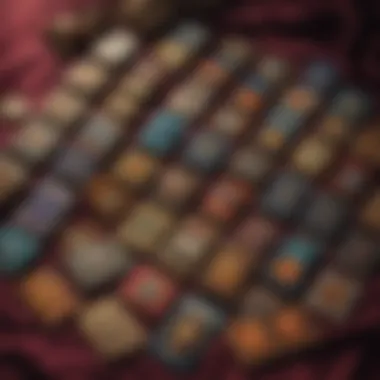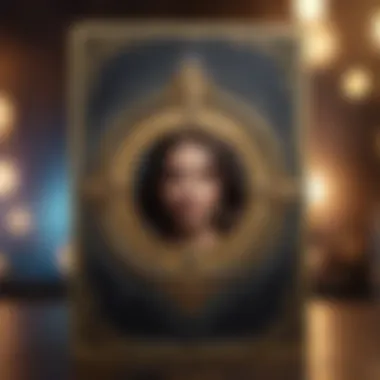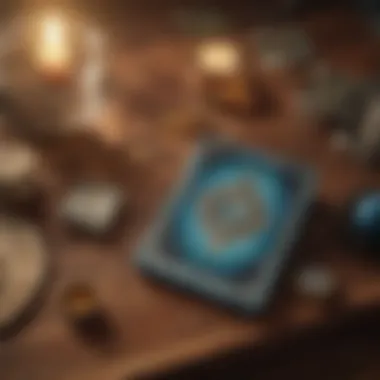Psychic Cards Meanings: Unveiling Their Significance


Intro
Understanding psychic cards involves grasping their meanings, significance, and the various contexts in which they are utilized. This exploration aims to provide a deeper insight into the vibrant world of psychic cards, shedding light on their purpose in intuitive practices. By delving into how they correlate with other divination methods and discerning the psychological and spiritual ramifications, one can enhance their understanding and effective application of these tools.
The conversation about psychic cards often includes a vast array of interpretations and combinations, influenced by individual practices. It is essential to recognize how different types of cards interact within intuitive frameworks. Thus, this guide offers an extensive examination of their meanings, types, and applications.
Understanding the Zodiac
Psychic cards are not restricted only to their own interpretations but can often reflect astrological dimensions too. Thus, understanding the Zodiac is crucial for any practitioner in the field.
Overview of Zodiac Signs
The Zodiac is comprised of twelve distinct signs, each embodying unique traits and energies. These signs include Aries, Taurus, Gemini, Cancer, Leo, Virgo, Libra, Scorpio, Sagittarius, Capricorn, Aquarius, and Pisces. Each sign represents different aspects that can enhance the understanding of psychic cards in relation to personal energies.
Sign Traits and Characteristics
- Aries: Bold, adventurous, and energetic.
- Taurus: Grounded, stable, and reliable.
- Gemini: Communicative, adaptable, and curious.
- Cancer: Nurturing, sensitive, and intuitive.
- Leo: Charismatic, confident, and creative.
- Virgo: Analytical, meticulous, and practical.
- Libra: Harmonious, diplomatic, and artistic.
- Scorpio: Passionate, resourceful, and enigmatic.
- Sagittarius: Optimistic, free-spirited, and philosophical.
- Capricorn: Disciplined, ambitious, and responsible.
- Aquarius: Innovative, independent, and humanitarian.
- Pisces: Imaginative, compassionate, and intuitive.
Elemental Qualities
Each Zodiac sign also associates with one of four elemental categories: fire, earth, air, and water. This elemental connection can significantly influence the interpretation of psychic cards. For instance:
- Fire Signs (Aries, Leo, Sagittarius): Often embody passion and energy.
- Earth Signs (Taurus, Virgo, Capricorn): Represent stability and practicality.
- Air Signs (Gemini, Libra, Aquarius): Relate to intellect and communication.
- Water Signs (Cancer, Scorpio, Pisces): Connect with emotion and intuition.
Understanding these traits and qualities can help practitioners interpret psychic cards with added context, allowing for a richer reading experience.
Quote: _
Understanding Psychic Cards
Understanding psychic cards is key to unraveling their intricate meanings and how they interact across various aspects of intuitive practices. Grasping the foundational principles of these cards enables practitioners to make informed decisions during readings, leading to more insightful interpretations. The diverse types of psychic cards—each with unique characteristics—provide a rich tapestry of options for users. Each type serves a specific purpose, fostering different connections and insights. Incorporating this knowledge enhances the overall experience and potential for growth in intuitive practices.
Definition and Origin
Psychic cards refer to a toolkit of cards utilized for divination and intuitive guidance. Their origin can be traced back centuries, often intertwined with spiritual practices and cultural beliefs. The most well-known among these is the Tarot, which became popular in the 15th century. Other forms of cards, such as Oracle and Angel cards, emerged later, reflecting various philosophies and artistic expressions. Understanding the historical context of these cards is essential as it provides clarity on their current applications.
Types of Psychic Cards
The world of psychic cards is vast, encompassing various types that serve different purposes. Each type is distinct in its design, symbolism, and approach to readings. Practitioners must be aware of these differences to choose the most suitable deck for their needs.
Tarot Cards
Tarot cards are arguably the most recognized form of psychic cards. They consist of 78 cards divided into the Major and Minor Arcana. The Major Arcana features significant life themes, while the Minor Arcana addresses daily dilemmas and challenges. The versatility of tarot cards makes them a popular choice for many practitioners. Their detailed illustrations and rich symbolism allow for deep exploration during readings. The unique feature of tarot cards lies in the intricate imagery that prompts reflection and intuition during interpretation. While they can be complex to learn, their potential for providing profound insights outweighs the initial difficulty.
Oracle Cards
Oracle cards differ from Tarot in their structure and approach. Typically, there is no standard number of cards, and each deck can have its theme or focus. This flexibility makes Oracle cards approachable for beginners or those seeking specific guidance. Their open-ended nature offers freedom to interpret messages without rigid frameworks. However, this can sometimes lead to conflicting meanings depending on the artist’s intent. The broad range of topics, from love to healing, makes Oracle cards appealing for specific inquiries, though they may lack the depth found in traditional tarot.
Lenormand Cards
Lenormand cards, originally created in the 18th century, are distinct in their simplicity and straightforwardness. A standard Lenormand deck consists of 36 cards, each representing clear symbols that convey direct messages. The uniqueness of Lenormand lies in its emphasis on combinations and relationships between cards. This technique allows for succinct guidance on specific questions or situations. While less detailed than tarot, many practitioners appreciate Lenormand for its clarity and concise readings.
Angel Cards


Angel cards focus on spiritual guidance and messages from the Divine. Often, they feature imagery of angels and affirmation phrases promoting positivity and encouragement. They are particularly favored by those seeking support regarding emotional or spiritual dilemmas. The appeal of Angel cards is their uplifting nature, providing a safe space for introspection. However, practitioners may find that the messages can sometimes be vague or generalized, which could lead to misinterpretation. It is important to approach them with an open heart while discerning the messages received.
Psychic Card Interpretations
Understanding the meanings behind psychic cards is crucial for anyone involved in intuitive practices. This section will explore important aspects related to interpreting these cards, their benefits, and essential considerations. Psychic card interpretations can provide insights into personal situations, emotional states, and life paths. They allow users to tap into their intuition and connect with deeper knowledge.
Understanding Card Meanings
Every psychic card carries its own meaning that can vary based on context. Knowing these meanings is essential for clear readings. Each card often contains layers of significance. For instance, the Tarot's Major Arcana cards represent broader themes like life lessons, while the Minor Arcana cards tend to focus on day-to-day matters.
- Research and Familiarization: Familiarize yourself with various card meanings through books and reputable online sources like Wikipedia or Britannica.
- Contextual Awareness: Interpret meanings in relation to surroundings or the question posed.
- Personal Intuition: Trust your personal insights; they can add depth to traditional meanings.
Symbolism in Psychic Cards
Symbolism is a crucial aspect of psychic cards, enriching their meanings and deepening insights. Each symbol within a card serves as a visual representation of complex ideas and emotions. Understanding symbolism allows practitioners to access deeper interpretations. For example, the imagery of the moon in a card might signify intuition or hidden truths. Elements to consider include:
- Colors: Various colors evoke different feelings and meanings. Blue may symbolize calmness, while red could indicate passion or alertness.
- Imagery: Unique symbols like animals, objects, and landscapes can indicate various emotional states or life situations.
- Numerology: The number associated with a card also contributes to its overall meaning, linking to broader themes in numerology.
Intuitive Reading Techniques
Intuitive reading techniques empower card readers to interpret the cards beyond static meanings. Developing such techniques enhances the connection with the cards and fosters richer readings. Here are a few techniques to consider:
- Meditation Before Reading: Take a moment to clear your mind before starting. This aids in tuning into your intuition.
- Visualization: Picture yourself in a scenario related to the reading. This helps ascertain emotional responses linked to specific cards.
- Free Association: Write down immediate thoughts or feelings that arise during the reading process. This can lead to unexpected insights.
Regular practice of these techniques can refine your intuitive capabilities, making your readings more insightful.
Overall, the process of interpreting psychic cards involves a blend of understanding traditional meanings, deciphering symbolism, and honing intuitive skills. This comprehensive approach ensures more accurate readings while allowing for personal growth in the art of card interpretation.
The Process of Reading Psychic Cards
Understanding the process of reading psychic cards is crucial for anyone looking to delve deeper into intuitive practices. This process involves several elements that contribute to effective readings. A structured approach can enhance the reader's connection to the cards and ensure a more meaningful interpretation. It promotes a mindful engagement with the cards and helps the reader access their intuition more effectively, enabling them to gain insights that may not be easily accessible otherwise.
Preparing for a Reading
Preparation is the foundation of an effective psychic card reading. A serene environment can facilitate focus and connection. Before beginning, one should take a moment to center themselves. Creating a conducive space free from distractions greatly improves the reading experience.
Some steps to prepare include:
- Clearing the mind: Spend a few minutes in quiet reflection or meditation.
- Setting intentions: Clearly articulate what you seek to uncover from the reading. Whether it’s for personal insight or guidance, having a specific intention can guide the reading.
- Choosing the right deck: Selecting a deck that resonates personally influences the reading quality. Each deck holds unique energies and meanings, enhancing the overall connection.
This leading phase lays the groundwork for a meaningful interaction with the cards.
Shuffling and Drawing Cards
Shuffling is an integral part of the reading process. It not only randomizes the cards but also establishes a personal connection between the reader and the deck. This allows the cards to reflect the reader's energy and intentions directly. Different readers may have preferred techniques for shuffling, including a traditional riffle shuffle or a simple overhand shuffle.
Upon completion of the shuffling, the drawing of cards commences. It is advisable to draw cards one at a time. This maintains clarity and focus on each individual card, preventing overwhelm.
When drawing cards, consider:
- Trusting intuition: Choose cards based on gut feelings rather than rote procedures.
- Number of cards: Decide beforehand how many cards to draw. This can vary by reading style and desired depth of insight.
- Positioning: Each card plays a role in the overall narrative developed during the reading.
Interpreting Card Placement
Interpreting the placement of the cards is where deeper understanding emerges. Each position within the spread contributes a distinct meaning. A well-thought-out spread can guide your interpretation and provide clarity as you read through the cards.


Key considerations include:
- Understanding spreads: Familiarize yourself with common spreads, such as the three-card spread or the Celtic Cross, and their intended meanings.
- Connection between cards: Analyzing how cards relate to each other adds layers to the reading. For instance, if one card signifies challenges while another represents strengths, the interplay offers a nuanced view.
- Personal intuition: Ultimately, your intuition plays a significant role. Each reader may perceive card meanings differently, influenced by individual experiences and energies.
In summary, the process of reading psychic cards demands attention to detail at each stage. From preparation to interpretation, each step contributes to the overall clarity and insight of the reading. Through these methods, one can engage deeply with psychic cards, unraveling their complex meanings and significance in intuitive practices.
Psychic Cards and Spirituality
Psychic cards often serve as tools that bridge the material and spiritual worlds. This connection emphasizes their significance in psychic and intuitive practices. Understanding how psychic cards relate to spirituality enhances the user’s experience and insight, allowing for deeper interpretations and applications.
Psychic Cards in Meditation
Utilizing psychic cards during meditation can enhance focus and clarity. They serve as focal points, guiding the practitioner’s thoughts towards specific themes or questions. By incorporating cards into meditation, individuals often find that they can access deeper layers of consciousness.
Here are some key points on how to integrate cards into meditation:
- Select a Card: Before meditating, choose a card that resonates with your current state or intentions.
- Set the Atmosphere: Find a quiet space. A calm environment aids in concentration.
- Focus on Imagery: As you meditate, concentrate on the imagery and symbolism of the card. This can invoke emotions and thoughts that provide insights.
The benefits of this practice include increased intuition and a clearer understanding of one's spiritual path. Many users report a stronger connection to their inner self after these sessions.
Connecting with Higher Selves
Psychic cards also facilitate connection with higher selves. They allow practitioners to explore aspects of their psyche that may be obscured in daily life. By interpreting the messages from the cards, users can gain wisdom and guidance from their higher selves. This connection is crucial in personal development and spiritual growth.
Here is how to effectively engage with this practice:
- Establish a Comfortable Space: Create an inviting space where you feel safe to explore your thoughts and emotions.
- Draw Cards Intentionally: Instead of random draws, ask specific questions to guide the reading.
- Reflect on Meanings: Take time to reflect on what the cards reveal. This requires patience and openness to insights.
Engaging with one’s higher self through psychic cards can cultivate self-awareness. It can illuminate one's purpose and potential obstacles in life. Ultimately, these practices can lead to profound spiritual awakening and understanding.
Psychological Aspects of Psychic Cards
Psychic cards serve as a compelling medium for introspection and self-discovery. They are more than just tools for divination; they engage the psychological dimensions of the user. Understanding the psychological aspects of psychic cards is vital in this exploration, as it unveils how intuition and cognitive processes shape readings.
The Role of Intuition
Intuition plays a crucial role in psychic card readings. It acts as a bridge between the subconscious mind and the conscious interpretation of card meanings. When readers engage with psychic cards, they often rely on their intuition to extract deeper insights.
Intuitive skills can vary widely from person to person. Some may experience strong, immediate feelings when drawing cards, while others might not. It is essential to recognize that intuition can be cultivated over time. Practicing daily meditation or mindfulness often enhances one's intuitive abilities.
- Trusting your instincts allows you to interpret cards more effectively.
- Developing a personal connection with the cards can further enhance intuitive reading.
In many instances, the intuitive aspect proves beneficial in navigating complex life situations. This means that relying on instinct while interpreting cards fosters a more meaningful reading experience.
Intuition transcends logical reasoning. It is an inner knowing that can guide decisions.
Cognitive Bias in Readings
Cognitive bias can significantly influence how psychic card readings are interpreted. These biases occur when readers allow their personal beliefs or experiences to distort their understanding of the cards. A common example is confirmation bias, where one tends to favor information that confirms existing beliefs while dismissing contradictory data.
- Readers may gravitate toward interpretations that align with their wishes, leading to misreads.
- Awareness of cognitive biases can improve the accuracy and reliability of readings.
It is crucial for readers to recognize their biases and approach readings with an open mind. This can be achieved by reflecting on past readings and examining the influences that shaped the interpretations. Awareness fosters better decision-making and enhances the general effectiveness of psychic card practices.


In summary, the psychological aspects of psychic cards — including intuition and cognitive bias — emphasize the importance of mental frameworks within readings. Acknowledging these elements not only enriches personal experiences but also sharpens the overall understanding of psychic cards.
Common Misconceptions About Psychic Cards
Understanding the common misconceptions surrounding psychic cards is crucial in developing a comprehensive view of their roles and significance. These misconceptions can lead to skepticism or an incomplete understanding, which may hinder individuals from fully engaging with their potential. By debunking widespread myths, we create a clearer landscape for both novice and experienced users of psychic cards.
In essence, addressing these misconceptions not only enhances the practice of reading cards but also allows for personal growth and spiritual exploration. Only with accurate knowledge can one use psychic cards effectively as tools of insight and guidance.
Debunking Myths
Several myths persist regarding psychic cards which can create misunderstandings. Here are key myths and clarifications:
- Myth 1: Psychic cards predict the future with certainty.
Many believe that psychic cards can offer definitive predictions about the future. In reality, these cards provide insights and possibilities rather than certainties. They reflect the energies and situations currently surrounding an individual, offering guidance on possible outcomes based on current paths. - Myth 2: Only gifted individuals can read psychic cards.
This myth may discourage many potential practitioners. While intuition plays a role in readings, anyone can learn to interpret psychic cards through practice and study. Skills can be developed over time, regardless of one's innate abilities. - Myth 3: Psychic cards are linked to dark forces or evil.
The association between psychic cards and the occult often misguides people. Many systems, such as Tarot or Oracle, are based on archetypes and symbolism meant for self-reflection rather than malevolent practices. - Myth 4: Psychic cards require a strict set of rules.
While there are traditional guidelines, the interpretation of psychic cards can be fluid. Personal intuition matters and allows for unique readings that resonate differently with each individual. - Myth 5: Reading cards offers instantaneous clarity.
People expect immediate answers from readings, but often, clarity unfolds gradually. A reading is a starting point that encourages further consideration and exploration of one's life situation.
Advanced Psychic Card Techniques
The realm of psychic cards is vast and complex, rich with knowledge and practices that go beyond basic readings. Advanced psychic card techniques are essential for those who wish to deepen their understanding and enhance their skills in intuition and interpretation. Mastery of these techniques can provide a structured way to approach readings, enabling more nuanced insights and interpretations. This section will explore two significant areas: combining multiple decks and utilizing psychic cards for divination. Both practices require careful consideration and practice, yielding a wealth of information.
Combining Multiple Decks
Combining multiple decks is a sophisticated technique that can expand the breadth of insights gained during a reading. Each deck possesses its own unique symbolism and energy, which can complement one another when used in conjunction. For instance, pairing a Tarot deck with an animal oracle deck can blend archetypal meanings with instinctual insights. This melding can produce richer narratives and broader perspectives, enhancing the reader's ability to convey messages clearly.
When engaging with multiple decks, several factors should be taken into account:
- Intentionality: Always approach a reading with a clear intention. This focus will facilitate the integration of different energies.
- Familiarity: Make sure to have a strong understanding of each deck's framework. Contextualizing meanings can prevent confusion.
- Card Selection: Decide how to draw cards from each deck. This could be a set structure or spontaneous based on the reader's intuition.
Utilizing multiple decks not only provides varied perspectives but also promotes creativity in how insights are conveyed to the querent.
Using Psychic Cards for Divination
Using psychic cards for divination is one of the most profound applications of these tools. This method often involves leveraging the cards to tap into the subconscious, facilitating a deeper connection with spiritual and intuitive realms. The act of divination goes beyond simple prediction; it serves as a mirror to one's current state and future possibilities.
To effectively use psychic cards for divination, the reader should consider the following:
- Choosing the Right Deck: A deck that resonates with one's energy will yield more profound insights. Spend time with various options to find a suitable choice.
- Formulating Questions: The specificity of questions greatly influences the depth of the reading. However, remaining open to unexpected messages is equally crucial.
- Reading Contextually: Divination requires an understanding of context. A card's meaning may differ when paired with others or influenced by position during a layout.
The practice of using psychic cards for divination encourages self-exploration. It provides clarity, guidance, and an opportunity to engage with the broader universe on a more profound level.
"The connection between intuition and psychic cards is integral to achieving an accurate reading. Each interpretation brings forth not just meanings, but an alignment with one's higher self."
As one explores these advanced techniques, practice and openness remain the key drivers of success. The journey into deeper readings is often rewarding, leading to personal growth and enhanced intuitive skills.
Practical Applications of Psychic Cards
The practice of using psychic cards extends beyond mere fortune-telling or entertainment. Their practical applications can serve various aspects of life, offering guidance and insight that is valuable for personal growth, decision making, and exploring inner thoughts. By engaging with psychic cards, individuals might cultivate a deeper understanding of themselves, their relationships, and the environments they navigate.
Guidance in Decision Making
Making decisions can often feel overwhelming. Psychic cards can act as a helpful tool in deliberating choices. They offer a unique perspective that may not be easily accessible through rational thought alone. When individuals draw a card in the context of a specific decision, they might gain clarity on various outcomes or factors that they had not considered.
- For instance, drawing a card could highlight potential obstacles or affirm a path previously taken.
- It encourages introspection, prompting the user to align choices with their true values and instincts.
- This practice can facilitate an intuitive understanding of the situation, allowing for decisions that feel more authentic.
The process does not guarantee a definitive answer but can shed light on aspects of a decision based on the symbolic meanings of the cards drawn. Particularly in crucial times, relying on these insights could enhance confidence in the choices made.
Self-Reflection and Growth
Self-reflection is essential for personal development. Psychic cards provide a unique approach to engage with one's inner self. Users can explore their thoughts, feelings, and behaviors with clarity. During readings, these cards often prompt users to consider their current state and areas in need of growth.
- By engaging with cards regularly, individuals might identify patterns in their behavior and choices.
- They can track emotional responses to different situations, understanding what influences their feelings.
- This is a path to greater self-awareness and emotional intelligence.
Reflective journaling can enhance this experience. After draws, noting impressions and insights can clarify understanding over time. The practice of self-reflection supported by psychic cards cultivates emotional growth and resilience.







